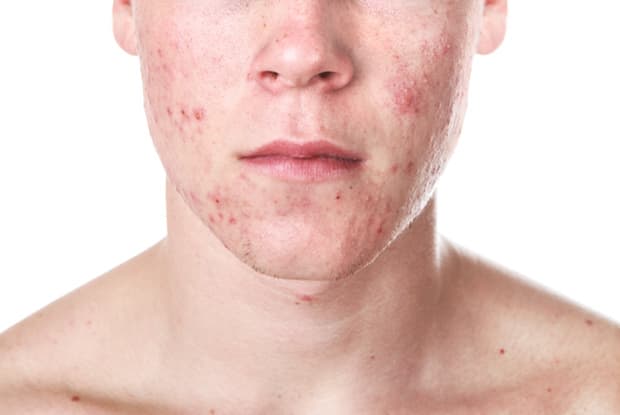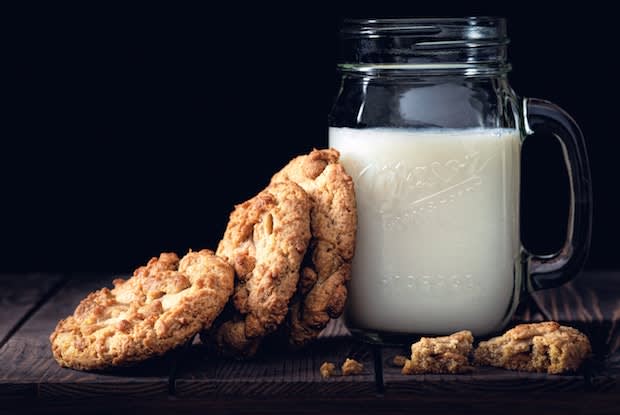Table of Contents
II. Foods That Can Worsen Acne
What is Acne?
Acne is a skin condition that causes pimples and skin blemishes. Acne is incredibly common and affects more than 80 percent of people between the ages of 12 and 24. [1] Although acne usually occurs during the teenage years, it can affect people of any age.
Acne usually occurs on the face but is also commonly found on the back, shoulders, neck, and chest. This condition can cause several different types of skin blemishes. Common pimples include blackheads and whiteheads. However, patients with more severe acne may also suffer from larger pus-filled pimples that can become easily inflamed and cause permanent scars. As well as the physical effects of acne, many patients also experience anxiety, lowered self-esteem, and depression. [2]
There are three primary causes of acne. For most patients, there may be one more dominant cause, although all of these factors play a role. The main causes are: Almost all skin pores contain a follicle, which includes a single hair and a sebaceous oil gland. Problems with these follicles then cause acne. Often one cause of acne will trigger the other causes, worsening the condition. The sebaceous oil gland produces sebum oil, which keeps skin soft. However, hormones, such as testosterone, can increase the amount of oil produced. Excess oil can form a plug, causing pimples. Having clogged pores is another common cause of acne. Usually, these pores are clogged by dead skin cells that have not been removed. Often these skin cells are stuck in excess sebum oil. Skin pores are also commonly clogged by sweat, cosmetics, or toxins in the air. Acne may also be caused by bacteria. Bacterial growth is often triggered by the other causes of acne as bacteria can grower quicker in clogged pores or where there is a build-up of sebum oil. Acne is usually treated with topical medications such as creams, lotions, and gels. These may be over-the-counter medications for very mild acne or prescription medications for moderate to severe conditions. Popular acne medications include Retin-A (tretinoin), Tazorac (tazarotene), and Azelex (azelaic acid). As well as taking medications, lifestyle changes can also lessen the severity of acne symptoms. Keep reading to learn about foods that can worsen acne and foods that can make your skin appear healthier. Contrary to popular belief, a poor diet is not a cause of acne. However, poor nutrition and some food groups may increase the severity of symptoms or increase the risk of a breakout. Many people believe that eating excess amounts of chocolate can cause acne. Studies have shown that patients that regularly consume added sugars had a higher risk of acne. [4] Added sugars are, as the name suggests, sugars that have been added to foods during preparation. This includes cakes, sugary drinks, and chocolate. It does not include natural sugars that are found in fruit and milk. Sugary foods increase your blood sugar. This results in your body producing more insulin and also increases the amount of skin oil produced. [5] Refined carbohydrates also increase blood sugar levels when they are absorbed into the bloodstream. Refined carbohydrates are common in foods such as white rice, white bread, and pasta made with white flour. While limiting and avoiding sugary foods may be a well-known diet tip for those with acne, changing from refined flour products to wholemeal can also lower your blood sugar. [6] Eating fatty and greasy foods can also increase the risk of acne. As well as being high in refined carbohydrates, foods such as burgers and French fries may alter the levels of hormones that cause acne. However, more research is needed. Working in a fast-food restaurant can worsen the symptoms of acne. Spending a lot of time in an environment with a lot of oil can result in particles in the air clogging skin pores. [5] Research also suggests that dairy products may also worsen symptoms of acne. Common dairy products include milk, cheese, and yogurt. It is not known why dairy may worsen acne but dairy-free alternates such as soy or almond milk may help. [7] Some vitamins such as vitamin A, vitamin D, and vitamin E are anti-inflammatories and are common in fruits, nuts, and fish. Eating foods that are high in these vitamins can help reduce the severity of acne outbreaks. Water can also improve the appearance of skin. Drinking plenty of water benefits the body in several ways, but drinking more than six full glasses a day can reduce the severity of acne by helping new skin cells to grow. [8] If you believe your acne may be worsened by sugar, dairy, or any other food group, then you can try eliminating one of these products at a time from your diet for around a month. If there is no visible improvement, then add these foods back into your diet and eliminate something else. The content in this article is intended for informational purposes only. This website does not provide medical advice. In all circumstances, you should always seek the advice of your physician and/or other qualified health professionals(s) for drug, medical condition, or treatment advice. The content provided on this website is not a substitute for professional medical advice, diagnosis or treatment.
a. What Causes Acne?
b. Acne Medications
Foods That Can Worsen Acne

a. Sugary Foods
b. Refined Carbohydrates
c. Fatty Foods

d. Dairy
e. Other Diet Tips
